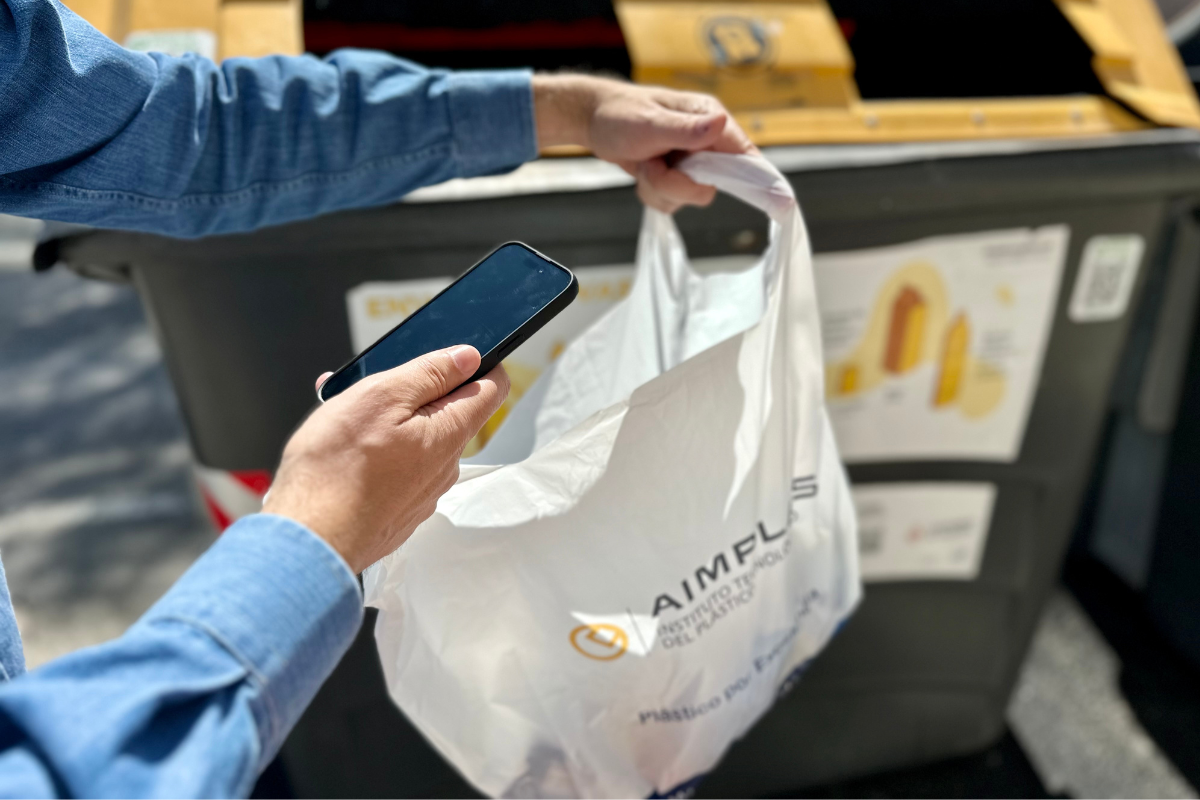
A project underway in Europe is working on an app that will gather data on household waste disposal and help consumers make good recycling decisions. | Courtesy of AIMPLAS
The ReciclAI360 Project is a large-scale strategic cooperation project funded by the Valencian Innovation Agency (AVI). Begun in 2022, the project has generated considerable expectation in the field of recycling because it aims to revolutionize and transform the current paradigm. The technology company NUNSYS will coordinate the project with the participation of key industry players, including TETMA, a waste management company; GENIA, which specializes in waste recovery; the UPV-VRAIN research group; and AIMPLAS, the Plastics Technology Centre.
The primary goal of the ReciclAI360 Project is the research and development of an intelligent, collaborative environment to significantly improve the current recycling process and strengthen the entire associated value chain. To achieve this, work is being done to create an innovative tool that enables citizens to become the main participants of all actions with the aim of addressing and solving the pressing need to increase the percentage of material recovered for recycling.
Putting information into the hands of households

Javier Grau
The main objective of the app under development is to share relevant, accurate information on how to properly sort waste at the source. To that end, the app will provide users with a comprehensive guide to frequently asked questions and to clear up queries on how different types of waste should be sorted and handled based on the type of packaging, the materials used to make it and other general factors affecting waste.
One of the key features of the app under development is its ability to estimate the amount of waste generated in households and to facilitate proper separation at source. The app will use advanced artificial intelligence and computer vision techniques to enable users to estimate the volume of waste contained in bags.
Users simply take a photo of the waste bag and select the appropriate bin where the bag should be placed. The app then uses algorithms and image analysis to determine the volume of the bag and add it to the total amount of waste generated by users or their household. To promote use of this app and increase citizen participation in the project, the designers are considering including persuasion and gamification techniques such as reward systems, rankings and other interactive features.
Addressing contamination issues
In addition to the development of this app, which represents the truly innovative use of deep learning and computer vision technologies, the ReciclAI360 Project also addresses the analysis of the problems currently facing MSW treatment plants. The aim is to identify the types of waste that should not go into the MSW stream and to understand the reasons why these objects continue to make their way to these plants.
When the most common items have been identified and the main reasons for their continued presence in the waste stream have been determined, a thorough study can be carried out to evaluate possible product improvements that can facilitate sorting at source. Possible actions to improve the recyclability of these objects and increase recycling rates will also be explored.
These actions could include improvements in product design, changes in the materials used and even citizen education campaigns through the app developed. The app will provide information on how to properly separate waste in households and will focus on aspects that are particularly confusing – such as sorting bioplastics and compostable plastics – as well as proper disposal of packaging with product residue inside.
It is essential to recognize that end consumers play a crucial role in proper waste management. For this reason, the ReciclAI360 Project strives to empower citizens by providing them with the knowledge and tools they need to separate waste properly at the source so it can be better managed and turned back into valuable raw materials.
Resources for packaging designers
In addition to the development of this innovative app, the ReciclAI360 Project also involves developing a guide for packaging companies. The guide will offer a set of specific guidelines for companies to take into account during packaging design, helping them consider the packaging’s entire life cycle from production to transformation into new raw materials.
Guidance will be provided on the composition of packaging, along with precise parameters to ensure that packaging can be efficiently detected and separated by sorting equipment in waste treatment plants. Development of this packaging design guide for recycling will take into account considerations and requirements that can be presented in other European and globally recognized guides and certifications.
The ReciclAI360 Project is thus a far-reaching strategic initiative that seeks to significantly transform and improve the recycling process by strengthening the entire associated value chain. Developing an interactive, educational app is designed to encourage citizen participation in proper separation of waste at the source. It will also address current problems in MSW treatment plants to identify specific improvements and promote the recyclability of objects in the waste stream.
The active involvement of end consumers and packaging companies is considered essential to achieve sustainable waste management and fully exploit the recycling potential of materials. The ReciclAI360 Project, therefore, aims to generate a positive impact on waste management and lay the foundations for a more sustainable and environmentally friendly future.
Javier Grau is a mechanical recycling researcher at the AIMPLAS Plastics Technology Centre in Spain.
The views and opinions expressed are those of the author and do not imply endorsement by Resource Recycling, Inc. If you have a subject you wish to cover in an op-ed, please send a short proposal to [email protected] for consideration.

